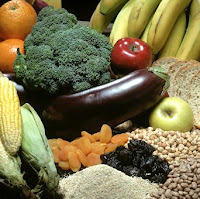
Many of my clients suffering from gastrointestinal and digestive problems have been told by their gastroenterologist to increase their fiber intake. They go out to Giant and buy Fiber One® bars and Benefiber® and come back to me complaining of an upset stomach. Let me break it down for you: all fiber is not created equally.
Research has shown that the fiber naturally found in beans, lentils, raw nuts and seeds, skins of fruits and vegetables, and whole grains (100% rye, brown rice, old fashioned oats, quinoa) do have numerous health benefits including lowering cholesterol, reducing constipation, decreasing risk of diabetes and heart disease. This research cannot necessarily be extrapolated to include the added fiber found in a lot of foods. Scan the rows of the grocery store and you will find yogurt, cottage cheese, cereal, cookies, sweeteners, and even water with extra fiber. These fibers can be termed “functional fibers” and include chicory, inulin, polydextrose, resistant maltodextrin, oligosaccharides, fructooligosaccharides, and methylcellulose. Fiber One® brand, for example, generally uses a combination of barley flakes and chicory root extract (not to mention high fructose corn syrup and partially hydrogenated oils).
Now some functional fibers do have their benefits, but if you rely on these manufactured, processed products for your fiber intake, you are kidding yourself. Psyllium husk (e.g., Metamucil®), can help with constipation and is cholesterol-lowering. Inulin (aka “chicory root extract”) is a prebiotic, meaning it provides food to healthy bacteria in the gut but its possible effect on disease risk reduction is still unknown. An isolated fiber ingredient called “maltodextrin,” conversely, is less likely to have an effect on digestive regularity or disease prevention, though more research is needed. Additionally, if your gut is not used to a bolus of fiber, you will experience gas or pain. Instead of adding a bar to your diet, slowly increase fiber with these tips:
- Mix ground turkey with black beans
- Switch from white rice to brown rice or quinoa
- Aim for apples and pears instead of bananas and orange juice
- Add nuts and berries to old fashioned oatmeal
- Choose 100% whole grain bread
- Leave the skins on your fruits and veggies and eat them raw once in a while
- Make a dip from lentils or add them to your soup
You can surely meet your fiber needs without relying on manufactured products and gain the health benefits - it kills two birds with one stone.

.jpg)